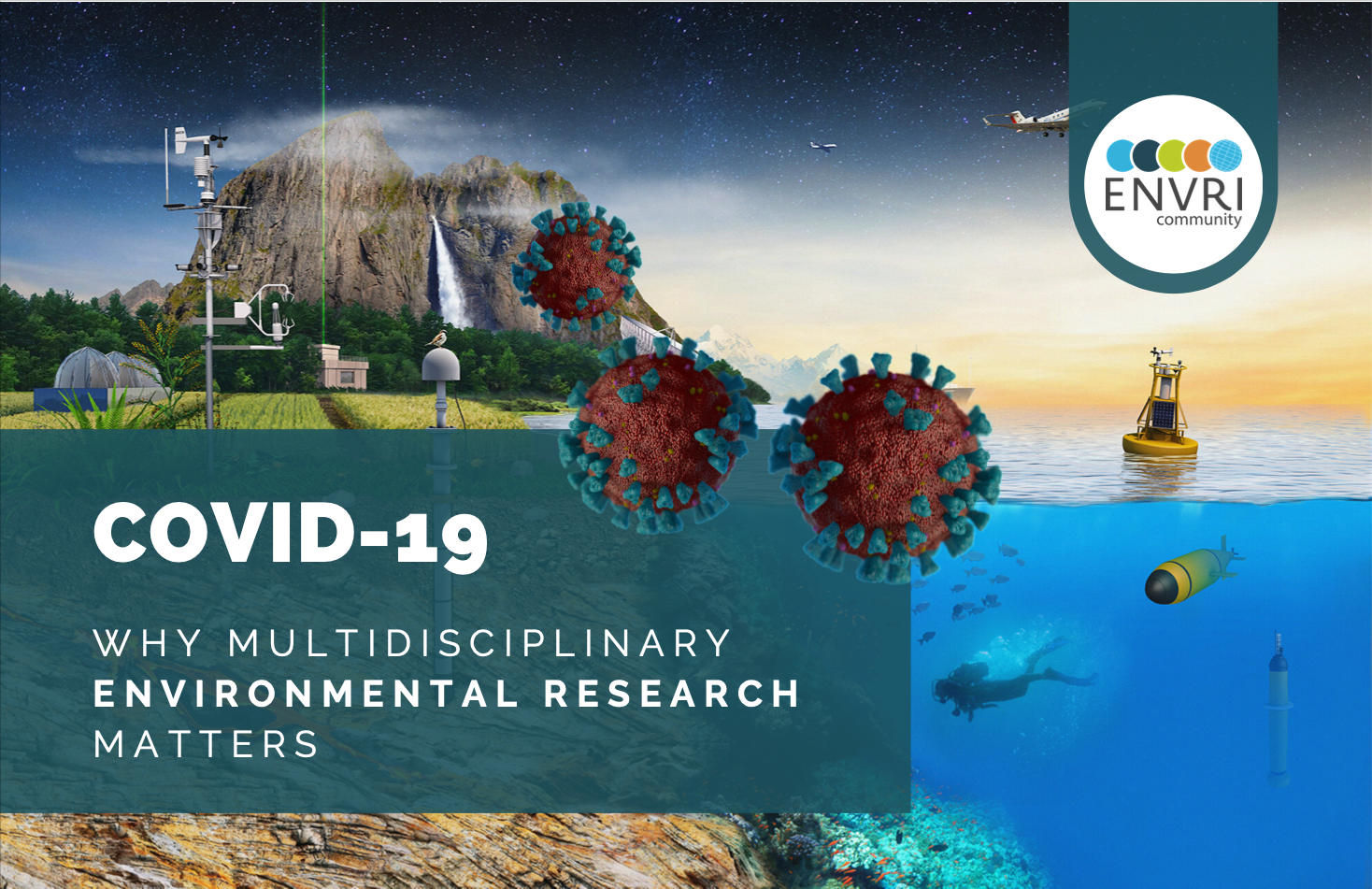The coronavirus (COVID-19) outbreak certainly is the most pressing issue our society is facing at the moment. We should redirect all our efforts on combating the spread of the disease, the treatment of already infected patients, and on the research scrambling to understand the disease better and to find a cure or vaccine against it.
European Environmental Research Infrastructures organized in the ENVRI cluster (envri.eu) cannot assist directly in tackling these burning issues but we can help understanding the environmental conditions which favor the evolution of pandemic, particularly when related to a warming climate, changes in ecosystems or biodiversity losses.
We should not forget that most of the challenges our society is facing today are not here by accident. In fact, they are related either to an incomplete understanding of the ecological fabric of our planet or to not taking environmental knowledge into account in political or economic decisions. Our Earth is a highly complex system where the environment and the living species are interacting, and changes in one component of the system can lead to a chain reaction of new and unexpected challenges. It is, therefore, essential that we understand the system where these changes originate and where they transmit (1).
Such need is also underlined by the Coronavirus pandemic that was most likely initiated by intense interaction between humans and wildlife (2).The zoonotic diseases, such as Bird flu, Ebola, SARS or MERS, are lately on the rise, due to their link to environmental change and human behavior. The disruption of forests, rapid urbanization and population growth are causing animals to loose habitats, which means species become crowded together and come into closer contact with humans than ever before. The environmental factors are playing a more significant role than previously understood in animal-to-human disease transfer (3) and in the spreading of the virus (4).
Whereas biomedical research focuses on studying the virus itself and examining its potential diagnostics, therapeutics, and vaccines to combat it, environmental research can offer answers concerning the origin and spread of the infection, and the environmental conditions favoring these harmful processes. Over the last few decades, it has become clear that effective disease prevention must consider the whole environment in which disease occurs. The maintenance of healthy people requires the maintenance of healthy ecosystems (5). Long-term research and monitoring of the biodiversity organization and ecosystem function and their response to environmental, societal, and economic drivers are therefore critical.
The biomedical community cannot accomplish understanding and mitigating the effects of zoonotic diseases without the collaboration of ecologists, wildlife biologists, and climate scientists (6).
Multidisciplinary science and coordinated global effort are the key.
Changes in the natural ecosystem and biodiversity organization are not the only environmental changes affecting these diseases – differences in land temperatures, ocean temperatures, sea level and acidity, CO2 concentration, rainfall patterns, or soil conditions – these all are influencing the emergence and spread of the zoonotic diseases (6).
Ingrid Puillat, Chair of the Board of European Environmental Research Infrastructures bringing together 26 environmental research infrastructures, agrees: ‘Indeed, some of the latest models suggest that certain places could favor the spread of the virus just in terms of their environmental parameters. Such parameters include surface air temperature, precipitation, elevation, population density and even CO2 emissions. It is necessary that we have the long- term and precise observations of such parameters to be able to see if we can estimate the risk of a certain country to have a high rate of infection.’
The diversity of these influencing factors once more calls for open science, multidisciplinary approaches, and cooperation across different scientific disciplines. It also requires collaboration across different continents, and therefore, a concerted global effort is necessary to predict and prevent outbreaks and emerging zoonoses such as COVID-19.
Andreas Petzold, the coordinator of ENVRI-FAIR project which builds an open, digital and collaborative space for environmental research, agrees: ‘European Union strongly supports the open and multidisciplinary science with the development of the European Open Science Cloud (EOSC). The goal of EOSC is to open up all scientific data and publications and combine the results to drive new discoveries. Environmental research infrastructures involved in building the EOSC through the ENVRI-FAIR project are, or will soon open up access to their environmental data there. We are convinced that such rich data assets will be pivotal for better understanding the functioning of our environment. Because that is where the current and future societal challenges originate and spread.’
Further cooperation is expected within the framework for mission-based research in the Horizon Europe framework programme for research and innovation. A further development of the missions in the light of the COVID-19 pandemic will be supported by the ENVRI community in order to boost the ideas about multidisciplinary research developed above. Ideally, this can help our governments to steer the currently evolving investment programs in support of their economies. These programs can be more or less smart when it comes to the transition towards more resilient, environmentally friendly and carbon-neutral societies which remains the goal also during this crisis.
Ingrid and Andreas conclude: ‘Joining our forces with the biomedical research infrastructures, but also social sciences and physics will enable true multidisciplinary research which is crucially needed in the current state of our Earth system and its looming evolution.’
Further information:
Magdalena Brus, ENVRI Communications Integrated Carbon Observation System, ICOS Phone: + 358 (0)50 415 4762 magdalena.brus@icos-ri.eu
Dr Andreas Petzold, ENVRI-FAIR Coordinator Forschungszentrum Jülich GmbH / IAGOS Phone: +49 (0) 2461-615795 a.petzold@fz-juelich.de
Ingrid Puillat, Chair of BEERi (Board of European Environmental Research infrastructures) IFREMER Brest PDG-ODE-LOPS-OC / JERICO-RI Phone: +33 679 28 93 23 ingrid.puillat@ifremer.fr
Dr Werner Kutsch, Deputy Chair of BEERi Integrated Carbon Observation System, ICOS Phone: +358 (0)50 448 4598 werner.kutsch@icos-ri.eu
Find the ENVRI statement on their website.

